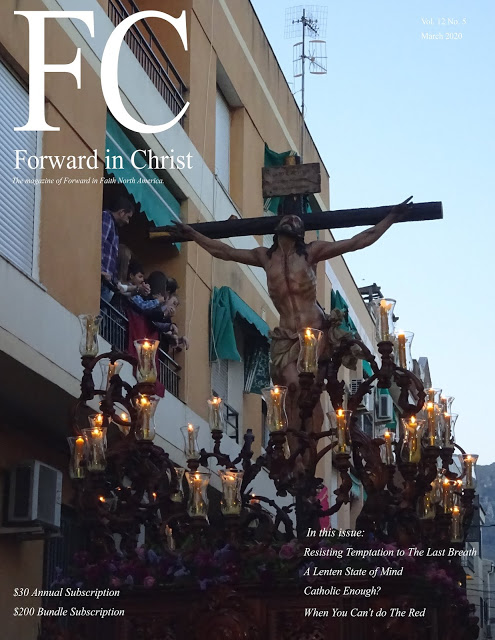“This is the great work of man; always to take blame for his own sins before God, and to expect temptations until his last breath.” St. Anthony the Great
So wrote St. Anthony the Great, considered to be the father of monasticism both East and West. Having inherited enormous wealth after both his parents died, Anthony was orphaned. Then one day he heard the words of Jesus Christ from St. Matthew’s Gospel, “If you want to be perfect, go, sell your possessions” (19:21). He sold and gave away all that he had.
Subsequently he entered the monastic life. At the time the way to do this was to live in community with other monks. Instead, Anthony of Egypt or Anthony of the Desert, as he is also referred to, chose life in a cave to live as an ascetic. There he engaged the hermitic (hermit or life alone) tradition of monasticism.
In his life of solitude, Anthony also discovered spiritual warfare as he had never known it before. He fought virtually every kind of demon of temptation. St. Athanasius, his good friend, records and preserves St. Anthony’s teachings in the classic biography of his life, the Life of St. Anthony. Thus began the influence of St. Anthony on saints East and West.
Perhaps the most famous bishop and theologian in the West to be influenced by St. Anthony was St. Augustine; in the Eastern Church he is recognized as Blessed Augustine. The famed Bishop in North Africa, also considered to be one of the four Doctors of the Church, learned about St. Anthony from his friend Ponticianus.
Ponticianus shared a story with Augustine about two of his friends who had discovered Athanasius’ Life of St. Anthony. These two read St. Anthony’s Life together. One of them, an Imperial Inspector, found himself blurting out in the midst of their reading, “Tell me, please, what is the goal of our ambition in all these labors of ours? What are we aiming at? What is our motive in being in the public service? Have we any higher hope at court than to be friends of the Emperor… But if I should choose to be a friend of God, I can become one now.” It was then that he discovered through St. Anthony’s life that all his worldly ambition was nothing compared to friendship with God. Both men were converted from their reading of St. Anthony’s Life.
Upon learning of what happened to the two about whom Ponticianus related, Augustine read St. Athanasius’ Life of St. Anthony. He writes in his Confessions of how at one point as a young, nineteen-year-old, he had prayed his legendary prayer, “Grant me chastity and continence but not yet.” After reading St. Anthony’s Life, he began to realize the time of “not yet” had come to an end.
Shortly thereafter, he sat outside the Cathedral in Milan listening to St. Ambrose preach on the Epistle to the Romans. There on a bench he heard a child singing a song in the background, tolle et lege, which means “take up and read.” Looking down he saw a text from Romans. He read it and the rest as they say is history. Augustine converted, returning to the faith of his mother, Monica, who had prayed for him all during his sojourn resisting the call of God on his life.
Significantly, both the Eastern and Western traditions on resisting temptation emerge from St. Anthony. In the West, St. Augustine forges a path in his own autobiography, Confessions. Combined with his other commentaries and writings, he develops a theology and way of fighting sin and temptation on which others would build. From Dante to C.S. Lewis, we learn much about the techniques of old Scratch, the Devil.
As for Lewis in particular, while studying at Oxford I joined the C.S. Lewis Club that often met at Pusey House, where I was doing most of my own doctoral research. I recall one evening that a speaker said, “Lewis provides in his writings perhaps the most extensive insight into the struggle with evil of any other in the Western Tradition of Christianity.” He went on to explain that Lewis had lived on the other side in the world of evil for much of his life. When he converted, he brought with him the detailed insights of the dark kingdom’s intrigue that entices so many with Faustian promises. Indeed, and he was given the gift of prose with which to communicate his insights about the ways of the Evil One with stories for children young and old. All of his writings if read carefully, are a tour de force on the corporate and individual ways of temptation.
In the Eastern Church, however, we find a tradition that provides perhaps the best analysis of the actual process of temptation. It is most clearly sketched in a work called the Philokalia. It is written by the 12th century St. Peter of Damascus, based on a collection of writings going back to the Church Fathers and other Eastern monastics. The process of temptation presented in the Philokalia builds primarily on a text from the Epistle of James in the New Testament. James writes:
“Blessed is the man who remains steadfast under trial, for when he has stood the test he will receive the crown of life, which God has promised to those who love him. Let no one say when he is tempted, “I am being tempted by God,” for God cannot be tempted with evil, and he himself tempts no one. But each person is tempted when he is lured and enticed by his own desire. Then desire when it has conceived gives birth to sin, and sin when it is fully grown brings forth death. “ (ESV)
James explains clearly that God is not the author of temptation; Satan is. God allows temptation as part of our testing. The classic example is Job. In the first chapter of this massive Old Testament book we learn that Satan had to ask permission to tempt Job. God gave it for the purpose of perfecting Job. The desired end for God was as James explains, “to receive the crown of life,” the ultimate reward for any believer. And as St. Anthony explains, temptation continues to our last breath. Temptation is endemic to our life in Christ just as it was part of His.
However, temptation is not sin. The fact that one is tempted does not mean he or she is weak or that a sin has been committed. Yet, temptation is the beginning of what can give birth to sin, to use James’ analogy. The Eastern Fathers and Desert Monks in the Philokalia provide us with a lucid development of the process. It is: 1. Provocation/bait; 2. disturbance/interaction/coupling; 3. assent; 4. captivity; 5. Passion. Sometimes disturbance and coupling are separated into two explaining why some will speak of six steps into the plunge into sin. The following is a simple explanation. I’ll explain them as a fivefold process combining 2 & 3.
First, temptation begins with provocation or as is sometimes called, bait. Fleeting thoughts or a surprising, unexpected situation enters the horizon of our journey with God. Satan is always ready through his minions, demons, to put bait on the hook to lure us into sin. Even when we’ve placed ourselves in a dangerous context, a target rich environment for sin, Satan takes advantage to offer temptation. He’s always ready to do this even if we’re not, and often especially, least expecting it.
Second, once the bait has been cast, a disturbance in our soul erupts leading to a coupling with sin. The thoughts and desires aroused are entertained. We begin to dwell on the sinful by forming images in our mind. We play with the image. We think we’ll be “okay” just for a moment to find pleasure in it. We often begin to experience emotional arousal over the images. This is a critical moment when we cross over into the beginning stage of sin.
Third, we give into conscious assent. This is sometimes described as the onset of seduction. We continue to find pleasure in the sinful thoughts. At the same time the soul may become further disturbed and even struggle. Then if not resisted, one decides to take action on the thought. Assent is given.
Fourth, the struggle continues to the point of becoming captive. A rationalization begins to provide a way to continue into some kind of action. No doubt by the grace of God we can choose to break free. If not, we become captivated to the point of being a prisoner to evil desire.
Fifth, passion overtakes us. The thoughts that have been enticing and increasingly envisioned begin to control us. They even start to form a habit. There may be a back and forth. But by being allowed to stay around too long in our thoughts, hearts, and lives, too persistently, and by being too passive to the temptation, the desire becomes a passion dominating our existence.
St. Maximus the confessor summarizes: “First the memory brings some passion-free thought into the intellect. By its lingering there, the passion is aroused. When passion is not eradicated, it persuades the intellect to assent to it. Once this assent is given, the actual sin is committed.”
The Good News of the New Testament is that Grace is greater than all our sin! Jesus Christ is Lord. He is the Liberator clad in His glorious armor to fight for us. But we must make a conscious choice to resist and to fight. We have a conscious choice at every stage of the temptation. St. Paul tells us to put on Christ and His armor (Ephesians 6). If we will, we can resist temptation.
Again, St. Maximus summarizes well the help that God will give to those who resist. He says, “Some temptations bring men pleasure, some grief, some bodily pain. The Physician of our souls by means of his judgments applies the remedy to each soul according to the cause of its passion” (The Ascetic Life and Four Centuries on Charity).
The hope we have is perhaps best stated by St. John Climacus, “The sea is bound to be stirred up and roused and enraged, so to cast out of it again on to the dry land the wood, the hay, and the corruption that was brought down into it by the rivers of the passions. Let us watch nature, and we shall find that after the storm at sea there comes a deep calm.” In this life we taste of those intermittent calms. But to end where we began, the ultimate calm will not come according to St. Anthony until we take our last breath.
God help us to stay in the fight against the world, the flesh and the devil until we breathe our last. And then there will be calm as never known beside the still waters of heaven.


